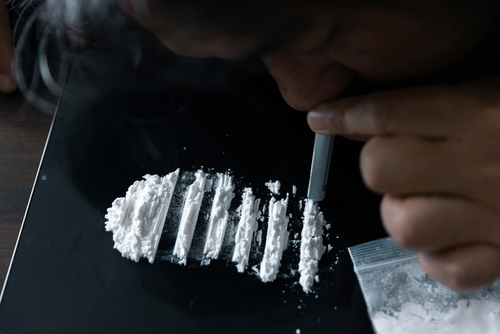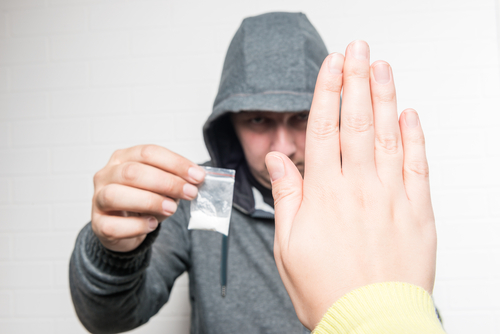Struggling with a cocaine addiction can be a challenging experience, but it’s essential to know that recovery is possible. Beginning the recovery journey of quitting cocaine may seem overwhelming, but there are many resources available to assist individuals in stopping their substance abuse. As you begin this process, we have gathered 10 tips on how to quit cocaine to guide individuals.
In this article, we will explore the relationship between cocaine and addiction, cocaine withdrawal, and 10 tips on how to quit cocaine to help individuals take the first steps toward a healthier, sober life.
Cocaine & Addiction
Cocaine, also known as coke, is a powerful stimulant drug with a high potential for addiction. Cocaine primarily affects the central nervous system, resulting in various physical and mental side effects. As cocaine travels throughout the body, it blocks the effects of neurotransmitters such as dopamine, serotonin, and norepinephrine in the brain. This results in increased levels of the neurotransmitters, affecting the brain’s reward system.
As individuals engage in repeated cocaine use, the brain adapts to the constant presence of the substance, leading to the individual developing a tolerance. This is when individuals need to take higher doses to achieve the same effects as before. When this cocaine use is stopped, individuals experience withdrawal, resulting in potentially life-threatening symptoms and a cocaine addiction.
Cocaine Withdrawal Symptoms
Cocaine withdrawal symptoms can be difficult and dangerous as individuals try to stop cocaine abuse. While most symptoms are not life-threatening, some can be dangerous and significantly impact an individual’s physical and mental health. These symptoms may vary from individual to individual depending on the frequency of use, the dosage, and body composition. Some of the most common cocaine withdrawal symptoms may include:
- Intense cravings for cocaine
- Depression
- Anxiety
- Fatigue
- Increased appetite
- Muscle aches
- Irritability
- Sweating or chills
Cocaine Withdrawal Timeline
As an individual goes through the withdrawal process, they will experience various side effects. This, again, may vary from individual to individual depending on the frequency and duration of cocaine use, differences in metabolism, and the presence of other substance use disorders. However, there is a general timeline of the withdrawal symptoms that most individuals will experience. The cocaine withdrawal timeline may look like this:
- Crash Phase (Hours to Days After Last Dose): The early phase of cocaine withdrawal is often called the “crash.” This phase begins within hours after the last use and may last a day or two. During this phase, individuals typically experience a profound sense of fatigue, depression, and an intense craving for more cocaine.
- Acute Withdrawal Phase (Days 2 to 7): Withdrawal symptoms may intensify for days 2 to 3. Anxiety, irritability, and restlessness may become more intense as the individual continues to face cravings for cocaine. For days 4 to 7, withdrawal symptoms peak around this time. Symptoms such as depression, anxiety, tremors, muscle pain, and sweating or chills may overwhelm some during this phase.
- Subacute Withdrawal Phase (1 to 2 Weeks and Beyond): Most withdrawal symptoms will gradually fade away after the acute phase. However, individuals may still experience lingering cravings, anxiety, or depression. These symptoms may continue for several months after quitting cocaine.
10 Tips on How to Quit Cocaine
Quitting cocaine is a challenging and overwhelming task, especially after knowing the withdrawal symptoms. However, overcoming drug addiction can significantly improve physical and mental health and lead individuals toward a happier and healthier sober life. A plan for quitting cocaine can significantly increase the chances of a successful recovery. Before we discuss 10 tips on how to quit cocaine, it’s important to note that every recovery journey is different, and it’s essential to find what works best for you in your recovery. Here are 10 tips on how to quit cocaine:
Acknowledge the Problem
The first step to quitting cocaine is recognizing that you have a problem. Be honest with yourself about the negative impact cocaine has on your life, health, and relationships.
Seek Professional Help
Reach out to a healthcare professional or addiction specialist. They can assess your situation, provide guidance on treatment options, and create a personalized plan for your recovery.
Build a Support System
Inform your friends and family about your decision to quit cocaine. A strong support system can offer encouragement, understanding, and emotional support during your recovery journey.
Avoid Triggers
Identify the situations, places, or people that trigger your cocaine use, and do your best to avoid them. Creating a drug-free environment is essential for successful recovery.
Develop Coping Strategies
Develop healthy coping strategies to deal with stress, anxiety, and drug cravings. These may include mindfulness meditation, exercise, deep breathing, or engaging in activities you enjoy.
Monitor Your Progress
Keep a journal to track your progress, including your triggers, cravings, and achievements. Regularly reviewing your journey can provide motivation and insights.
Set Clear & Realistic Goals
Establish clear, realistic, and achievable goals for your recovery. Individuals can establish a sense of purpose and direction by setting these goals. This can help you stay motivated and focused on your sobriety.
Utilize Medication-Assisted Treatment
Medications may sometimes be prescribed to help manage cravings and withdrawal symptoms. This is referred to as Medication-Assisted Treatment (MAT) and is used by medical professionals to help treat those in medical detox, inpatient treatment, or outpatient treatment programs.
Form Healthier Habits
Forming healthier habits to replace addictive and destructive behaviors can help individuals break the addiction cycle. Instead of drug use, individuals may do activities such as yoga, walking, hiking, painting, or listening to music.
Stay Committed to Recovery
Recovery is a process that takes time. Understand that setbacks may occur, but they don’t define your success. Stay committed to your goal of quitting cocaine, and be patient with yourself.
Cocaine Addiction Treatment at East Coast Recovery Center
Cocaine addiction is a complex and difficult addiction to suffer from. While there are many tips that can help individuals quit cocaine, the best way to stop drug use is to seek professional help from an addiction treatment center.
At East Coast Recovery Center, we provide holistic, evidence-based, and individualized addiction and mental health services to those struggling with substance use disorders or mental health conditions. We believe that addiction is unique to everyone, and we prioritize utilizing treatment options to assess the underlying causes of addiction. Our center offers treatment options for various addictions, such as Day Treatment, Partial Day, medication-assisted treatment, aftercare support services, and dual diagnosis.
If you or a loved one are suffering from drug abuse or mental health issues, contact us today to learn more about our treatment programs.













